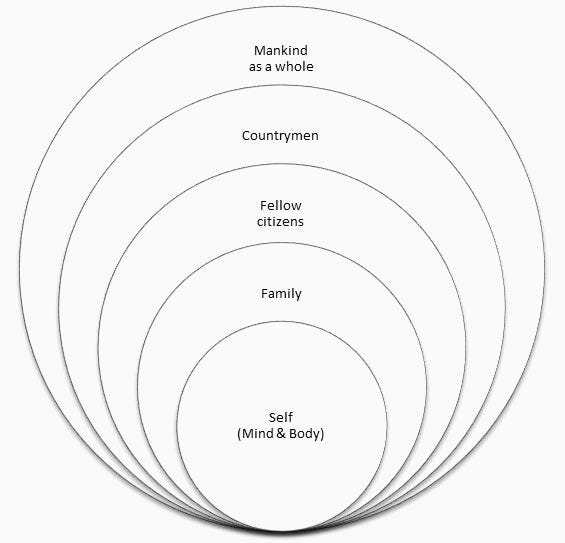I’ve found thinking about Justice in terms of a ship and crew have been helpful. Morality steers the ship in the right direction, and teamwork and leadership are both crucial to getting the ship to the destination in one piece. Are you making sure your group is headed in the right direction? Are you doing your part? Are you bringing the best out of others? (added August 2024)
Threads of love and kindness wend through our personal lives, binding together family and friends. These strands pass directly through us, so we can feel our way along the lines that connect us to those we love. In other words, the love we feel for family and friends is tangible.
As group size increases, however, so do the demands on these unifying threads, and so they’re weaved into large nets and cast upon groups as a whole. As group members, we kind of know this canopy exists, but given its loosely draped nature it can be challenging to grasp.
The way we as individuals navigate, interact with, and reinforce this unifying fabric underpins the virtue of justice. While love and kindness involve relationships between, justice involves relationships among. The differences between love and kindness and justice are nevertheless more of degree than kind; as groups shrink in size and become more personalized, the one-to-many strengths of justice converge with the one-to-one strengths of love and kindness.
Hierocles, a Stoic, described these degrees of familiarity with what he called the circles of concern (shown below), whereby the strength of our concern towards a subject was proportional to its distance from the center. Those with a strong sense of justice are those able to relentlessly reel in those outer rings closer to themselves; to build intimacy with the among and transform them into the between.

Morality
Morally bankrupt people attract envy or hatred from other moral bankruptees, and attract pity from those with moral strength. Those with strong moral character, on the other hand, attract admiration. To cultivate morality is, essentially, to cultivate a well-rounded character, which is the chief aim of this series as a whole.
Prompts
What is valuable?
Do I know right from wrong?
What makes an act right or wrong?
Who or what do my conceptions of right and wrong serve? Can I make more more room for others?
Practices
Define your core values and principles. Reflect on whether your actions align with them.
Identify and learn from individuals who exemplify strong moral character.
Teamwork, Loyalty, Social Responsibility
These three strengths relate to an individual’s role in maintaining and elevating the whole to which they belong. Those who embrace these qualities tend to see themselves as existing to serve their hosts; those bereft of these qualities see their hosts as existing to serve them, and, like a cancer, bitterly feed off their host until they’re either exterminated or their host dies. The selfless and dutifully dedicated are rewarded with sustained flourishing. Play the long game.
Prompts
When was the last time I worked well in a team?
When was the last time I did the right thing when nobody was looking?
Do I ask what my group can do for me, or what I can do for my group?
Practices
Participate in group activities (sports, clubs, community events, etc.)
Be honest, reliable, and consistent.
Reach out in support to others in times of difficulty.
Build a habit of acknowledging the strengths of teammates and expressing appreciation for them.
Leadership
True leaders are invisible. The technology that streams audio and video to our digital screens only becomes noticeable when the signal lags. We only notice the car we’re driving when the engine starts knocking. We don’t want these things to be noticeable, what makes a technology great is when it can disappear and fulfill its function in secrecy. In the same way, true leaders are invisible when things are going right, so that when their work is done, their followers claim they did it themselves.
To inspire, build a system that inspires. To build this, believe in what you’re working towards. Believe in the future people of your organization—give them the courage to exceed their self-limiting beliefs.
Once a system becomes worthy of admiration and a source of inspiration, it speaks for itself so you don’t have to.
Prompts
Do I try to elevate others towards something better?
Do I believe in the project I'm working on?
Am I enthusiastic about what I'm working towards?
Practices
Instead of worrying about failing to get recognition, be too busy doing the things that entitle one to recognition.
Be strict with yourself and lenient with others.
Pursue virtue and goodness and model it to others.
Search for the best in others and bring it out of them, even when they can’t see it.
If you have questions you ask yourself or practices you engage with that you find work well, I’d love to hear about them. Feel free to let me know in the comments.




